Health Care > EXAM > Med-Surg II Exam 4: Metabolic & Endocrine/Hypothalmus and Pituitary Disorders (All)
Med-Surg II Exam 4: Metabolic & Endocrine/Hypothalmus and Pituitary Disorders
Document Content and Description Below
Hypothalmus and the pituitary hormones - ANSWER Antidiuretic Hormone (ADH) - Renal tubules Oxytocin - Smooth Mx in uterus/Mammary glands TSH - Thyroid Adrenocorticotropin (ACTH)- Adrenal Cortex ... Prolactin-Mammary glands Growth Hormone (GH) - Bones, tissues Gonadotropins (FSH & LH) -Ovaries, testes Endocrine disorders - ANSWER USUALLY... -excess of a specific hormone -deficiency of specific hormone -receptor defect Hypothalmic Disorders - ANSWER Hypothalamus: -controls temperature of body by producing thyroid hormones -regulates other important mechanisms such as: -thirst -hunger -sleep Causes of Hypothalamic Disorders - ANSWER -Malnutrition -excessive iron intake -lack of essential nutrients -anorexia -Trauma -head injury -Tumors Anterior Pituitary Gland - ANSWER Adenohypophysis -problems can arise from: -anterior pituitary gland -alterations in hypothalamus function that change action of anterior pituitary gland -due to undersecretion or oversecretion of one or more anterior pituitary hormones Hypopituitarism -one hormone only = selective hypopituitarism -all hormones = panhypopituitarism -RARE!!! Hyperpituitarism -Decreased Production Pituitary Hormones -ACTH & TSH deficiencies -MOST life-threatening -cause decrease of adrenal and thyroid hormones -GH deficiencies -Indirect effect -stimulates liver to produce somatomedins -results in growth retardation in children -osteoporosis in adults Hypopituitarism Etiologies - ANSWER -Variable, may be idiopathic -Tumor (benign or malignant) -Severe malnutrition -Severe hypotension -Shock -hypoxia/infarction -head trauma -brain infections -radiation or surgery of the head and brain -AIDS Sheehan's Syndrome - ANSWER -pituitary infarction due to postpartum hemorrhage -postpartum hemorrhage is the most common cause of pituitary infarction -pituitary normally enlarges during pregnancy -hypotension from hemorrhage = ischemia and --necrosis of the pituitary gland -usually develops immediately after delivery -may occur several years later Hypopituitarism Assessment - ANSWER -Physical appearance -Neurologic manifestations -vision changes with tumor growth -Direct or indirect measures of hormones -Radiological studies -skull x-ray for changes in sella turcica -CT and MRI for bone or soft tissue lesions -Angiogram Clinical manifestations of ACTH deficiency - ANSWER -decreased serum cortisol levels -pale, sallow complexion -malaise and lethargy -anorexia -postural hypotension -headache -hypoglycemia -hyponatremia -decreased axillary & pubic hair (women) Clinical manifestations of TSH - ANSWER -Decrease thyroid hormone levels -Weight gain -Intolerance to cold -Scalp alopecia -hirsutism -menstrual abnormalities -decreased libido -slowed cognition -lethargy Clinical manifestations of GH - ANSWER -decreased bone density -pathologic fractures -decreased muscle strength -increased serum cholesterol levels Hyperpituitarism - ANSWER Increased Production Pituitary Hormones -Hormone oversecretion -Occurs with pituitary tumors & hyperplasia -anterior pituitary cells most like to have tumors occur: -Growth hormone (GH)- producing cells -Adrenocorticotropic hormone (ACTH)-producing cells -Excess may occur with increased secretion of melanocyte-stimulating hormone (MSH) Pituitary adenoma - ANSWER -most common cause of hyperpituitarism -benign tumor of one or more -tissues within the anterior pituitary -classified by size, invasiveness, and hormone secreted -may be enclosed or invasive -if sella turcica is involved, considered invasive -neurologic and endocrine symptoms as the tumor gets larger and compresses brain tissue Pituitary adenoma Sx's - ANSWER -visual changes -headache -increased ICP Sx's of ICP - ANSWER -Δ's in LOC -Eyes -Papilledema -Pupilary Δ's -Impaired eye movement -Posturing -Decerebrate -Decoricate -Flaccid -↓ motor function -Δ in motor ability -Posturing -HA -Seizures -impaired sensory and motor function -Δ in vital signs -Cushing's Triad -↑ systolic BP -↓ pulse - Alt. respiratory pattern -Vomiting -Δ's in speech Acromegaly - ANSWER Disorder of IGF-1 which causes excessive growth of hands, feet, jaw, and internal organs in adulthood. -Overproduction of GH in adults -Onset may be gradual with slow progression -may be unnoticed for years -Early detection essential -may be able to prevent irreversible changes in soft tissues -Some changes reversible with treatment -skeletal changes are permanent -MRI shows pituitary tumor in 90% of patients w/acromegaly Oral glucose suppression test - ANSWER Best test to confirm acromegaly -In acromegally, glucose does not supress GH Gigantism - ANSWER Abnormally high linear growth due to excessive action of IGF-1 before the closure of epiphyseal growth plates in childhood. Clinical manifestations of acromegaly - ANSWER -folding of the scalp skin -thickened lips -kyphosis and backache -coarse facial features -increasing head size -protrusion of the lower jaw -deepening of the voice -tufting of the fingertips -large hands & feet -joint enlargement and pain -barrel-shaped chest -excessive sweating -airway narrowing -sleep apnea -enlarged heart, lungs, and liver -hyperglycemia Excessive Adrenocorticotropic Hormone (ACTH) - ANSWER -Overstimulates the adrenal cortex -Excessive production of the glucocorticoids, mineralocorticoids, and androgens -Leads to development of Cushing's disease (hypercortisolism) Clinical Manifestations of Cushing's Disease (Pituitary) - ANSWER -Elevated plasma cortisol levels -Weight gain -Truncal obesity -"moon face" -Extremity muscle wasting -Loss of bone density -Hypertension -Purple striae -Acne -Hyperpigmentation -Hyperglycemia -Thin, easily damaged Clinical Manifestations: TSH - ANSWER -Elevated plasma TSH levels -Elevated plasma thyroid hormone levels -Weight loss -Tachycardia and dysrhythmias -Heat intolerance -Increased GI motility -Fine tremors Hyperpititurism Assessment - ANSWER -Depends on excess hormone -Age, gender, family history -Change in hat, glove, ring, or shoe size -Lethargy or fatigue -Backache and/or arthralgias (GH) -Headaches or visual changes -Skull X-rays for sella turcica abnormalities -CTs and MRIs for soft-tissue lesions -Angiogram -Suppression testing -Determines functioning of negative feedback control high blood glucose levels suppress release of GH—if they do not drop, abnormal test. Hyperpititurism non-surgical interventions - ANSWER -Psychosocial support -Radiation therapy -not useful in immediate management -may take several years for therapeutic effect to be seen. -Drug therapy -may be used alone or in combination with surgery and/or radiation -most common drugs: -Dopamine agonists -Bromocriptine mesylate (Parlodel) -Cabergoline (Dostinex) -Pergolide (Permax) -stimulate dopamine receptors = inhibit release of GH shrink tumors. -bromocriptine mesylate (Parlodel) reduces GH levels and tumor size when GH levels remain high after surgery or before full effect of radiation occurs. -side effects of Bromocriptine mesylate (Parlodel): orthostatic hypotension, gastric irritation, nausea, headaches, abdominal cramps, and constipation -give with meal or snack to reduce side effects **absolutely contraindicated in pregnancy** Other acromegaly drugs include: somatostatin analogs and GH receptor blockers Hyperpititurism surgical interventions - ANSWER -Hypophysectomy -removal of the pituitary gland and tumor -most common treatment for hyperpituitarism -Surgical method dependent on tumor size and other patient factors. -both performed with patient in semi-sitting position -endoscopic transnasal approach -minimally invasive -uses smaller diameter instruments -less damage to nasal structures -Transsphenoidal approach -If tumor cannot be reached using either approach, craniotomy may be necessary. Transsphenoidal surgical approach - ANSWER -surgeon makes incision just above upper lip -retrieves the pituitary gland through sphenoid sinus -after removal, muscle graft (usually from thigh) to support area and prevent CSF leakage -nasal packing inserted & mustache dressing applied Care after hypophysectomy - ANSWER -neuro checks -I/O -deep breathing—no coughing -do NOT blow nose or sneeze -no brushing of teeth until incision heals -use floss or oral mouth rinses -no bending at the waist for any reason -monitor nasal drip pad -watch for CSF fluid (halo sign) -prevent constipation and any straining -teach self-administration of prescribed hormones Posterior Pituitary Gland - ANSWER -Neurohypophysis -disorders usually related to deficiency or excess of the hormone vasopression (antidiuretic hormone [ADH]) -usually occurs independently of anterior pituitary problems -Diabetes insipidus → ADH deficiency -Syndrome of inappropriate antidiuretic hormone (SIADH) →ADH excess Function of ADH - ANSWER -ADH increases the permeability of the renal distal tubule and collecting ducts to water. -less free water is excreted in urine -urine volume is decreased -concentration of urine is increased Diabetes Insipidus (DI) - ANSWER -water metabolism problem -ADH deficiency -decrease in ADH synthesis -inability of kidneys to respond to ADH -results in excretion of large volumes of dilute urine -may be nephrogenic, drug-related, neurogenic - primary, or secondary -may become severely dehydrated quickly—cannot reduce urine output. **Assess for Hx of head injury, pituitary tumor, or craniotomy** Types of DI - ANSWER -Nephrogenic DI -Inherited disorder -kidneys do not respond to ADH -actual amount of hormone produced not deficient -Drug-Induced DI -Lithium carbonate (Eskalith, Lithobid) -Dilantin -Demeclocycline (Declomycin) -both interfere with the response of kidneys to ADH -Primary DI -Defect in hypothalamus or pituitary gland -lack of ADH production or release -Secondary DI -tumors (in or near hypothalamus or pituitary gland) -head trauma -infectious processes -surgical procedures (hypophysectomy) -metastatic tumors -less often: brain hemorrhage, brain disease, or cerebral aneurysm Diabetes Insipidus Signs/Sx - ANSWER -Up to 20 L urine/day -↓ osmolality -↓ specific gravity -Hypovolemia -↑ thirst -Tachycardia -↓ BP ****************************************************************** -greatly increased urine output - polyuria (4 - 30 L/day) - 1st sign -low urine specific gravity (<1.005) -low urine osmolarity (< 100 - 200) -hypovolemia -increased plasma osmolarity (> 300) -increased thirst -polydipsia -output does not decrease when fluid intake decreases Diabetes Insipidus Nursing Care - ANSWER -Monitor fluids -Replace fluids -Assess neuro status -Assess vital signs -Assess mucous membranes DI Treatment - ANSWER Rx: Vasopressin DDAVP DI Assessment - ANSWER -Two of the three Ps of diabetes mellitus -POLYURIA -POLYDIPSIA -Assess for dehydration!!! -may develop shock from fluid loss -fluid I/O for 24 hours -do NOT restrict food or fluid (if not contraindicated) -DI if more than 4 L during this period and greater than volume ingested -amount may vary from 4 to 30 L/day!!! DI Interventions - ANSWER -administer medications -partial ADH deficit -chlorpropamide (Diabinese) PO -increases action of existing ADH -may also stimulate production of ADH in hypothalamus -antidiabetic agent that has some type of unknown mechanism of antidiuresis. -Severe ADH deficit -must replace ADH to maintain water balance -drug of choice is desmopressin acetate (DDAVP) -desmopressin acetate (DDAVP) -synthetic form of vasopressin -given orally or intranasally -severe dehydration, may be given IV or IM -IV form of DDAVP is 10 X stronger than oral form -response should occur within 1 hour of administration. -Vasopression (Pitressin) is an exogenous form of ADH DI Patient Education - ANSWER -Permanent DI patients will be on lifelong desmopressin or vasopressin therapy -Daily weights -same time, same scales, similar clothing -Signs and symptoms of water toxicity -persistent headache, acute confusion, seizures, hyponatremia) -Weight gain or water toxicity → Call 911 -Med-Alert jewelry Syndrome of inappropriate antidiuretic hormone secretion (SIADH) - ANSWER -Schwartz-Bartter syndrome -vasopressin (antidiuretic hormone [ADH]) secreted even when plasma osmolarity is low or normal -occurs with many pathologic conditions and drugs -ADH continues to be released, water is retained dilutional hyponatremia and fluid overload -increase in plasma volume increases GFR and inhibits renin and aldosterone release more sodium loss in urine and more serum hyponatremia SIADH Etiology - ANSWER Malignancies -small oat cell carcinoma of the lung -duodenal, pancreatic, or GU CA -thymoma -Hodgkin's and Non-Hodgkin's lymphoma Pulmonary disorders -viral & bacterial pneumonia -lung abscess -active TB -pneumothorax -chronic lung disease -mycoses -positive-pressure ventilation CNS Disorders -head trauma -infection -stroke -SLE -porphyria -tumor (primary or metastatic) [Show More]
Last updated: 1 year ago
Preview 1 out of 15 pages
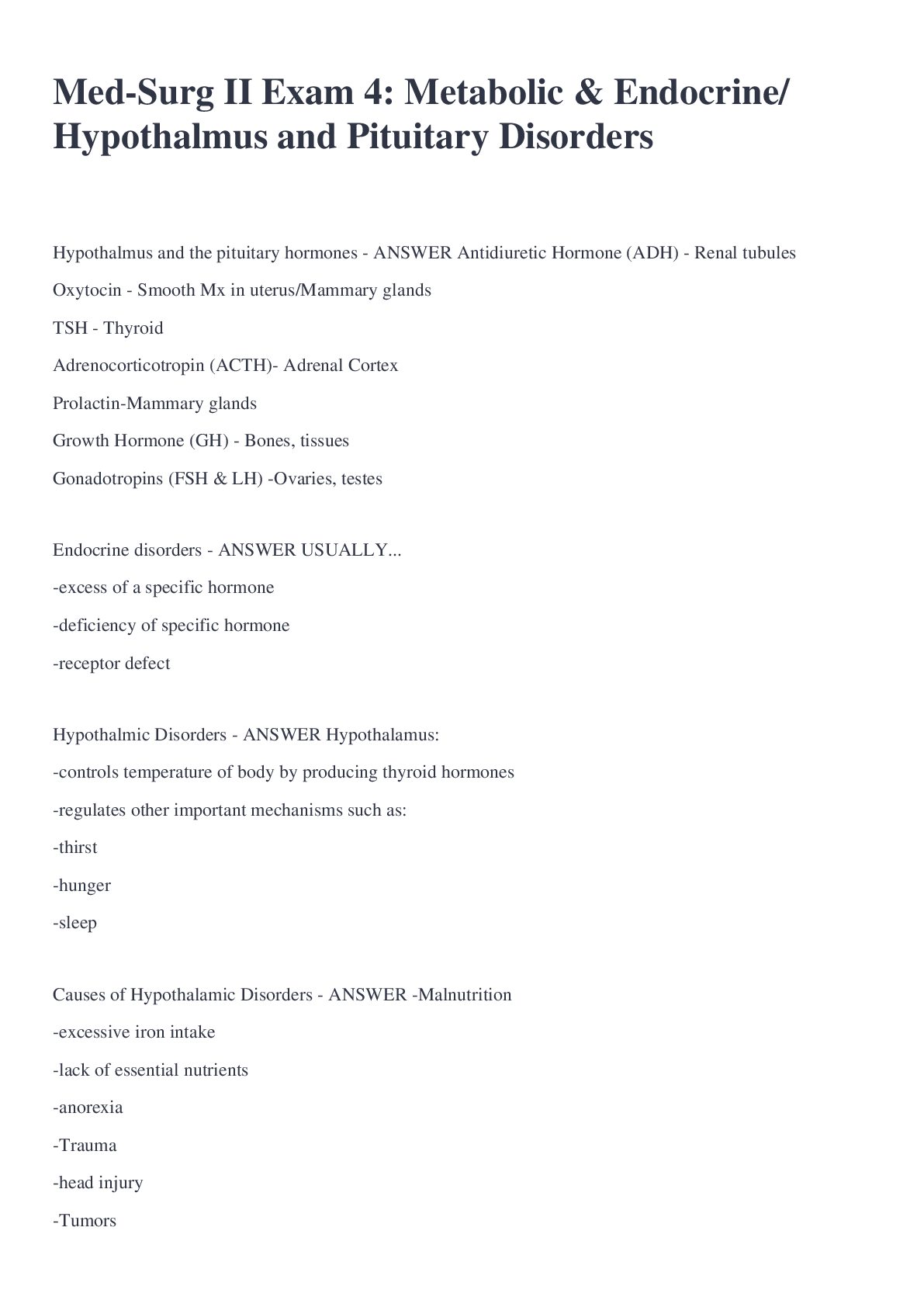
Reviews( 0 )
Recommended For You
Health Care> EXAM > Med-Surg II Exam 4: Metabolic & Endocrine/Parathyroid Disorders (All)
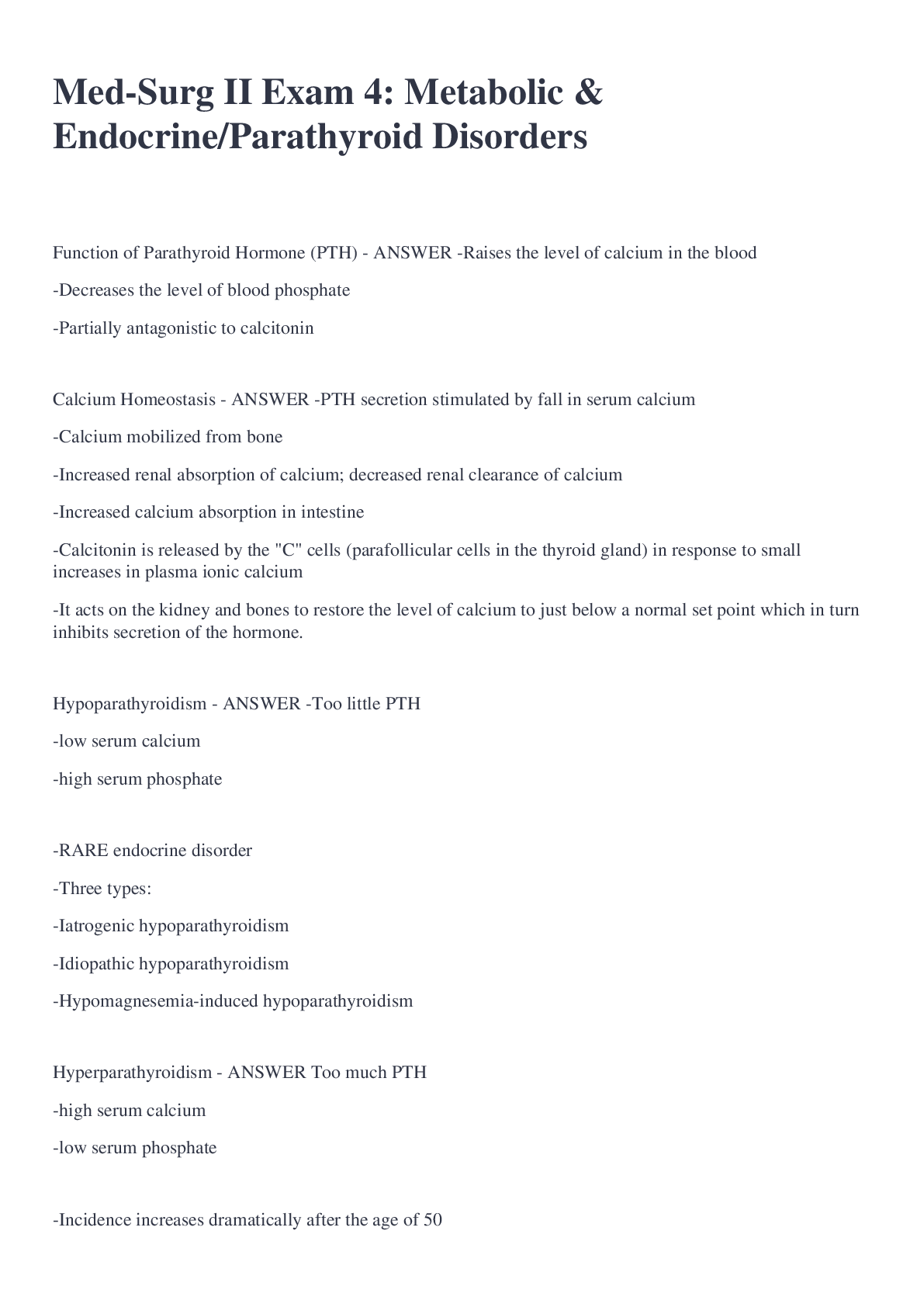
Med-Surg II Exam 4: Metabolic & Endocrine/Parathyroid Disorders
Function of Parathyroid Hormone (PTH) - ANSWER -Raises the level of calcium in the blood -Decreases the level of blood phosphate -Partially antagonistic to calcitonin Calcium Homeostasis - ANSWER...
By Nancylect , Uploaded: Dec 04, 2022
$10
Health Care> EXAM > Med-Surg II Exam 4: Metabolic & Endocrine/Adrenal Gland Disorders (All)
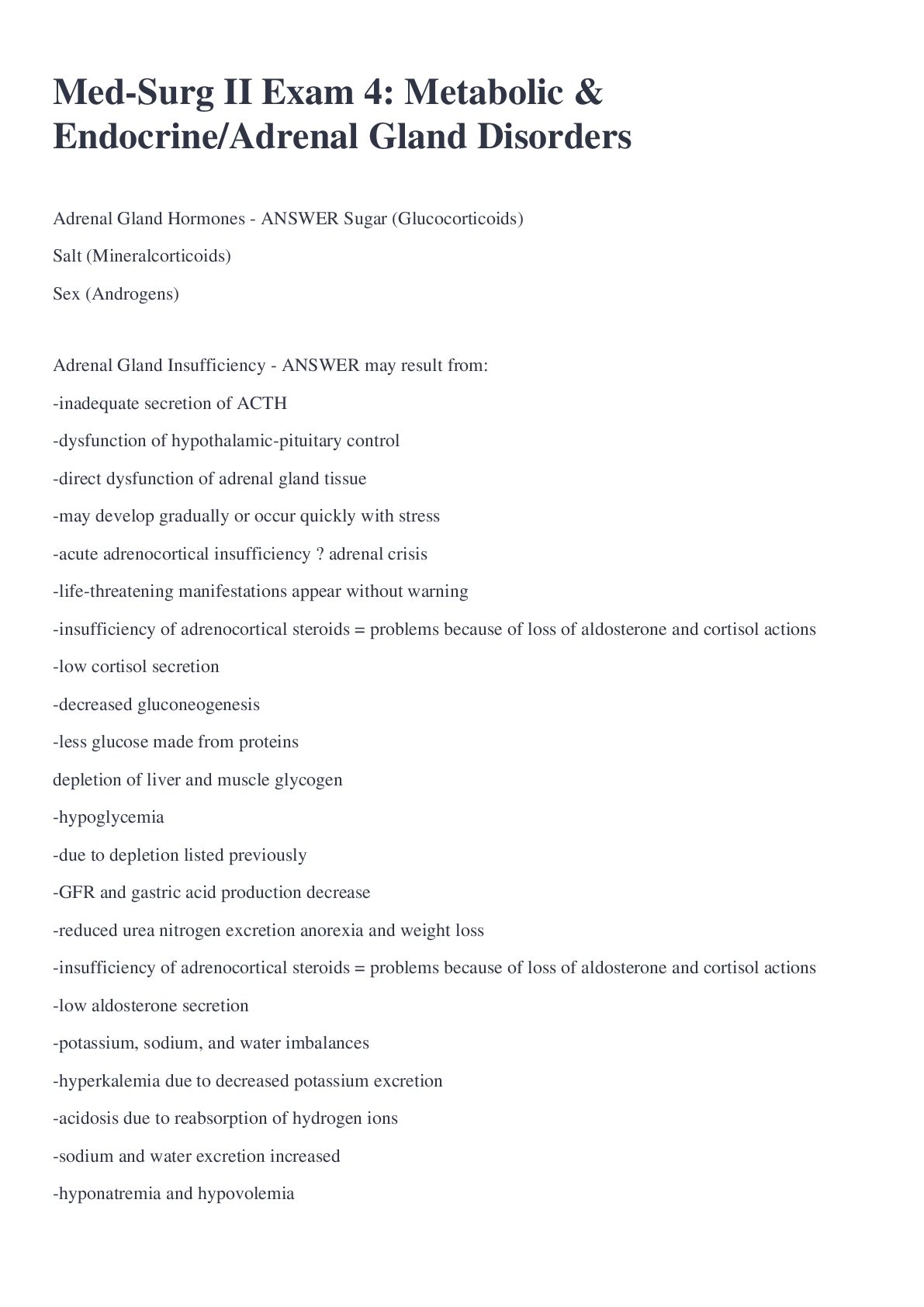
Med-Surg II Exam 4: Metabolic & Endocrine/Adrenal Gland Disorders
Adrenal Gland Hormones - ANSWER Sugar (Glucocorticoids) Salt (Mineralcorticoids) Sex (Androgens) Adrenal Gland Insufficiency - ANSWER may result from: -inadequate secretion of ACTH -dysfunct...
By Nancylect , Uploaded: Dec 04, 2022
$10
Education> EXAM > Med-Surg II Exam 4: Metabolic & Endocrine/Thyroid Disorders (All)
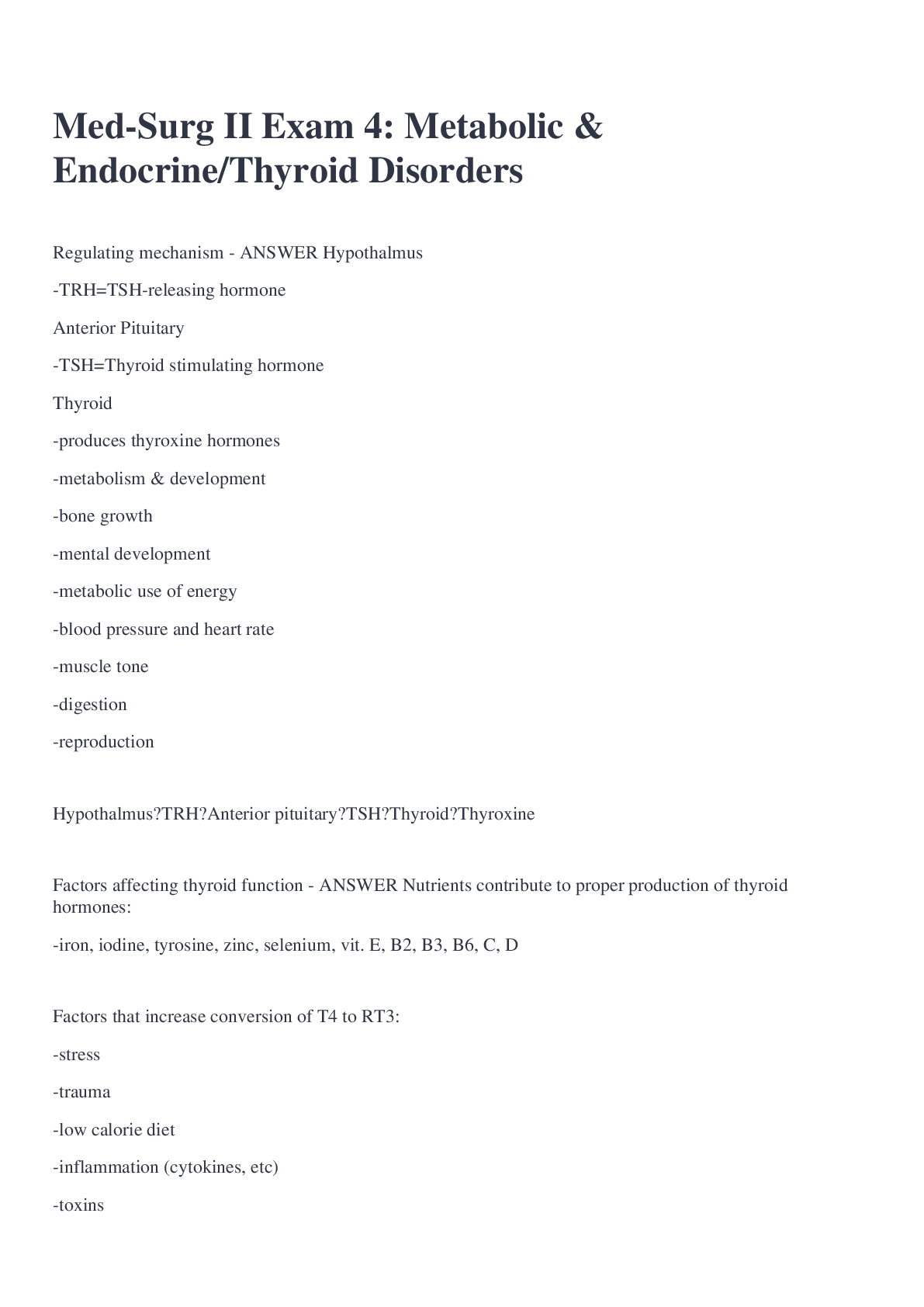
Med-Surg II Exam 4: Metabolic & Endocrine/Thyroid Disorders
Regulating mechanism - ANSWER Hypothalmus -TRH=TSH-releasing hormone Anterior Pituitary -TSH=Thyroid stimulating hormone Thyroid -produces thyroxine hormones -metabolism & development -...
By Nancylect , Uploaded: Dec 04, 2022
$10
Health Care> EXAM > Ethics for Health Professions HCA-200 Final Exam Questions with Answers 100% Correct (All)

Ethics for Health Professions HCA-200 Final Exam Questions with Answers 100% Correct
Ethics for Health Professions (HCA- 200) Final Examination Part 1: Multiple Choice (1 points each) ● Identify the choice that best completes the statement or answers the question. ● Clearly circ...
By Quiz Merchant , Uploaded: Apr 19, 2021
$9
*NURSING> EXAM > ENPC Test Questions & Answers (All)
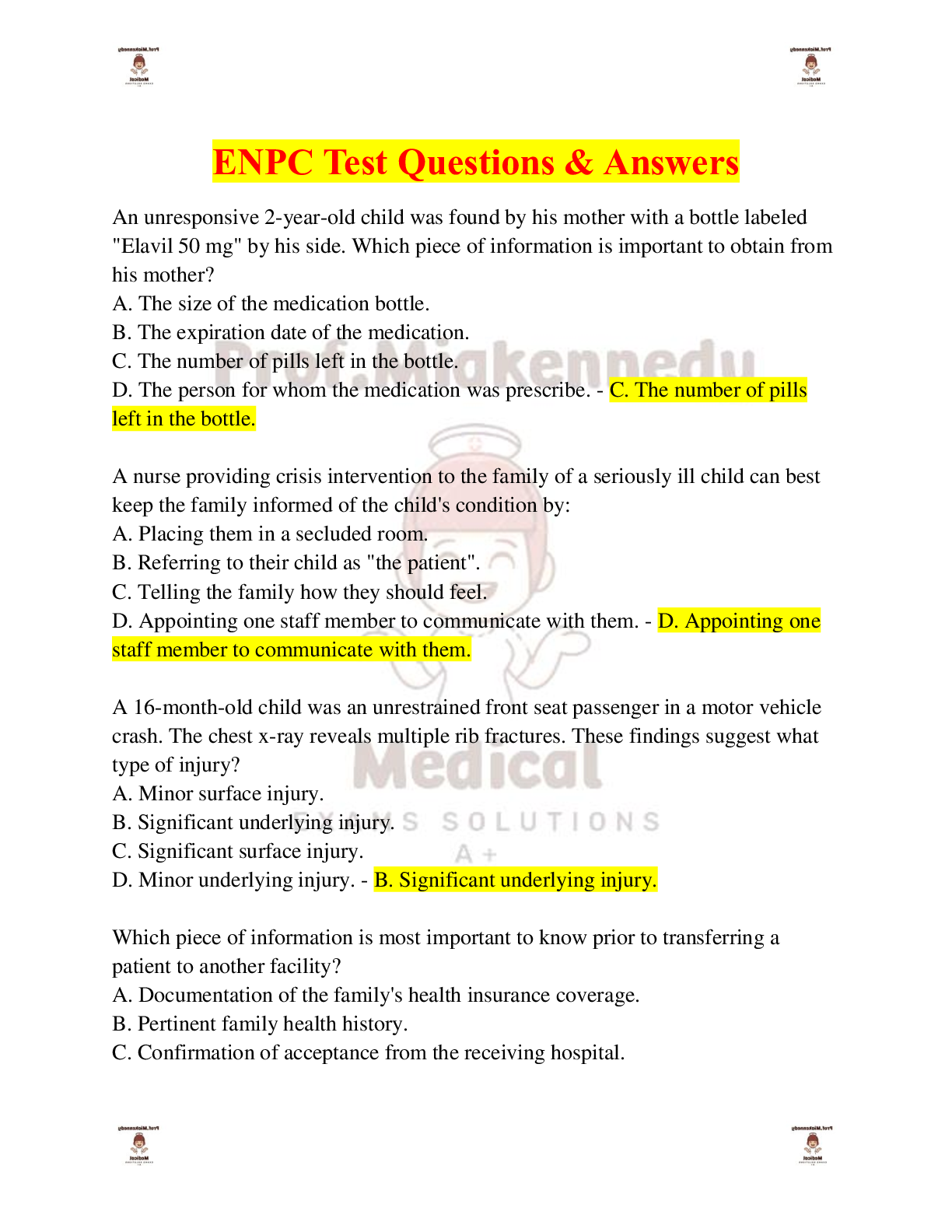
ENPC Test Questions & Answers
ENPC Test Questions & Answers-An unresponsive 2-year-old child was found by his mother with a bottle labeled "Elavil 50 mg" by his side. Which piece of information is important to obtain from his moth...
By PROF , Uploaded: Apr 25, 2024
$9.5
Religious Studies> EXAM > CWV TOPIC 2 QUIZ. QUESTIONS AND ANSWERS LATEST UPDATED. (Score 100%) (All)
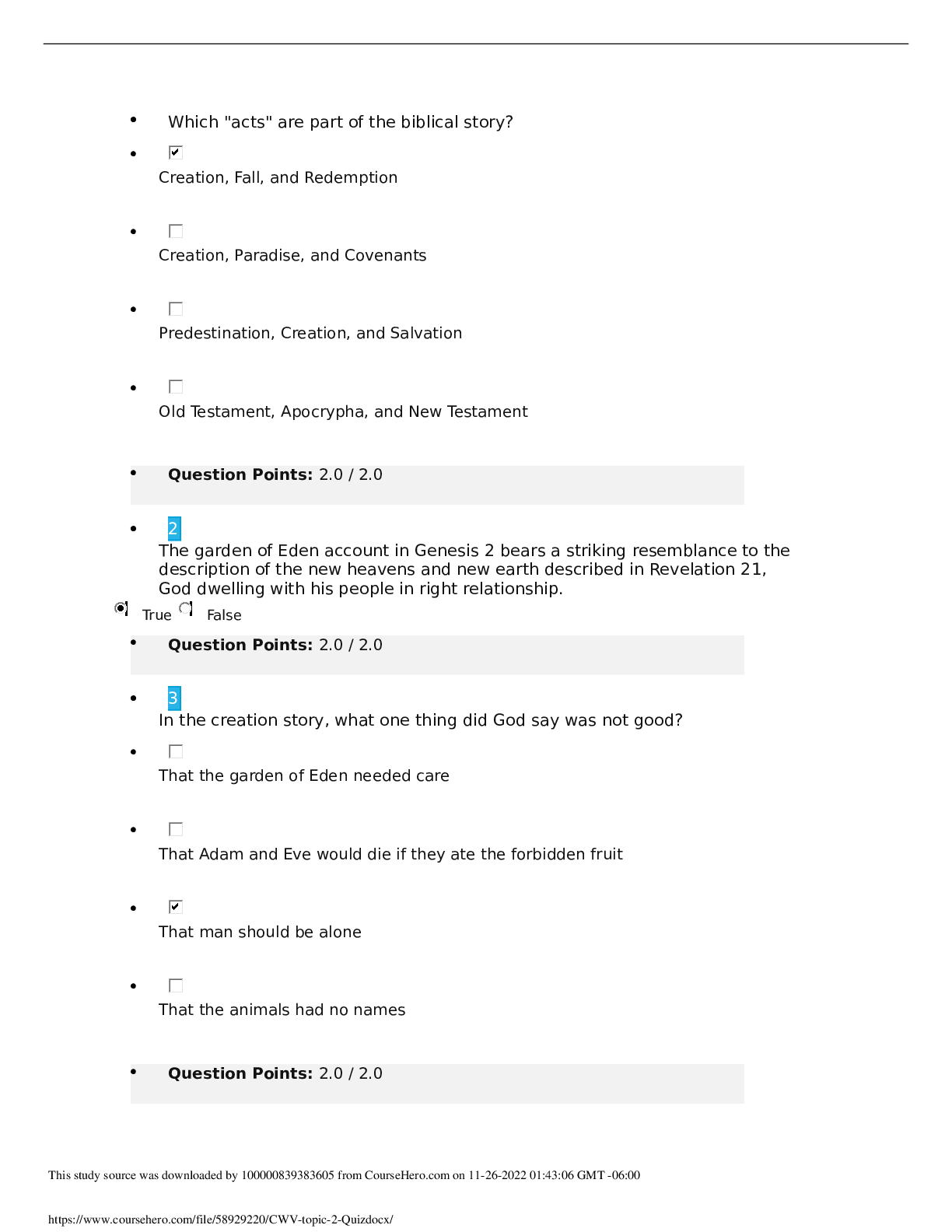
CWV TOPIC 2 QUIZ. QUESTIONS AND ANSWERS LATEST UPDATED. (Score 100%)
CWV TOPIC 2 QUIZ QUESTIONS AND ANSWERS LATEST UPDATED
By ELIANA , Uploaded: Aug 01, 2022
$9
ATI MED SURG PROCTORED> EXAM > Med Surg ATI Proctored Exam Test Bank 2023/2024 With NGN (All)
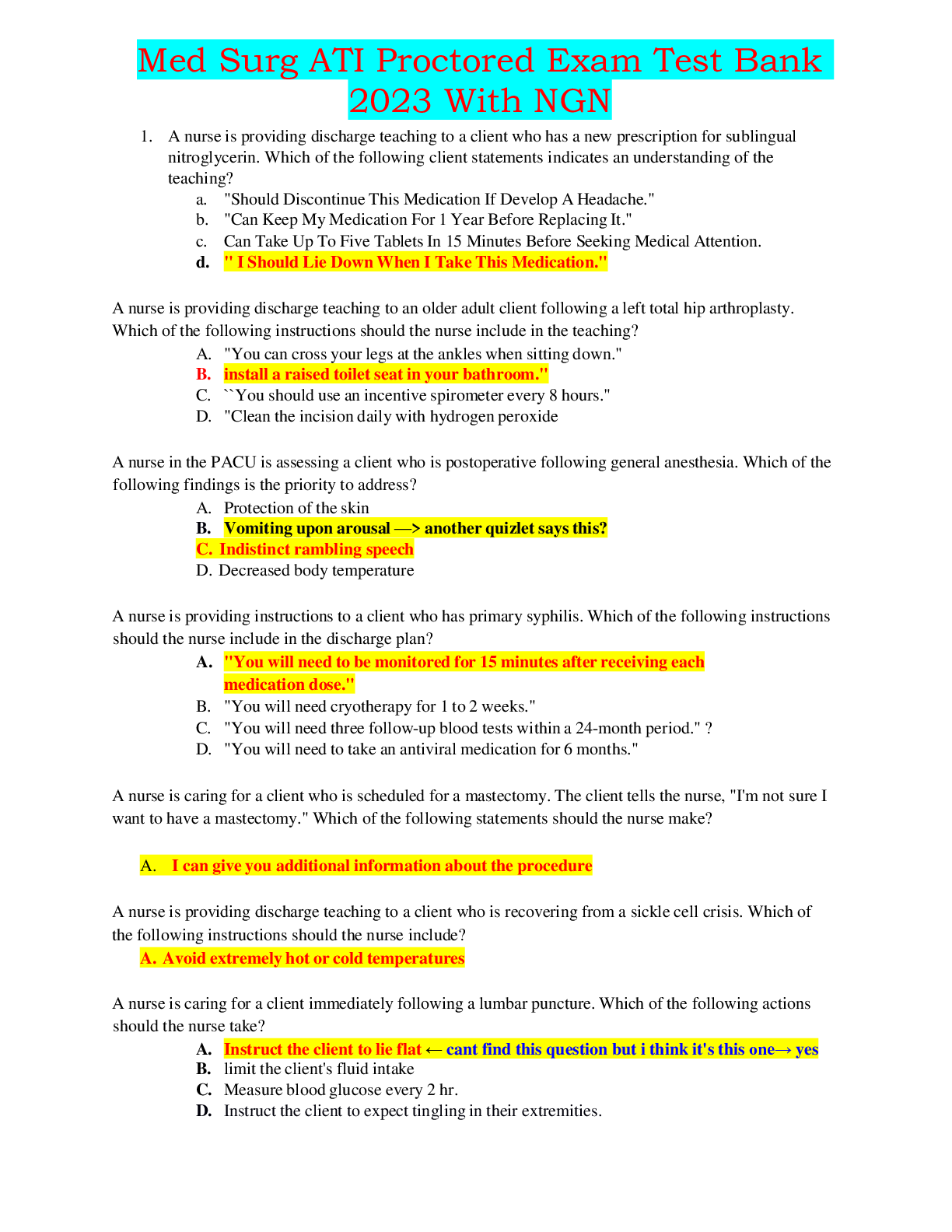
Med Surg ATI Proctored Exam Test Bank 2023/2024 With NGN
Med Surg ATI Proctored Exam Test Bank 2023/2024 With NGN Med Surg ATI Proctored Exam Test Bank 2023/2024 With NGN Med Surg ATI Proctored Exam Test Bank 2023/2024 With NGN Med Surg ATI Proctored E...
By EXAMHUB SOLUTIONS , Uploaded: Apr 15, 2024
$30.5
NURSING.> EXAM > ATI RN CUSTOM; MENTAL HEALTH NEXT GEN (All)
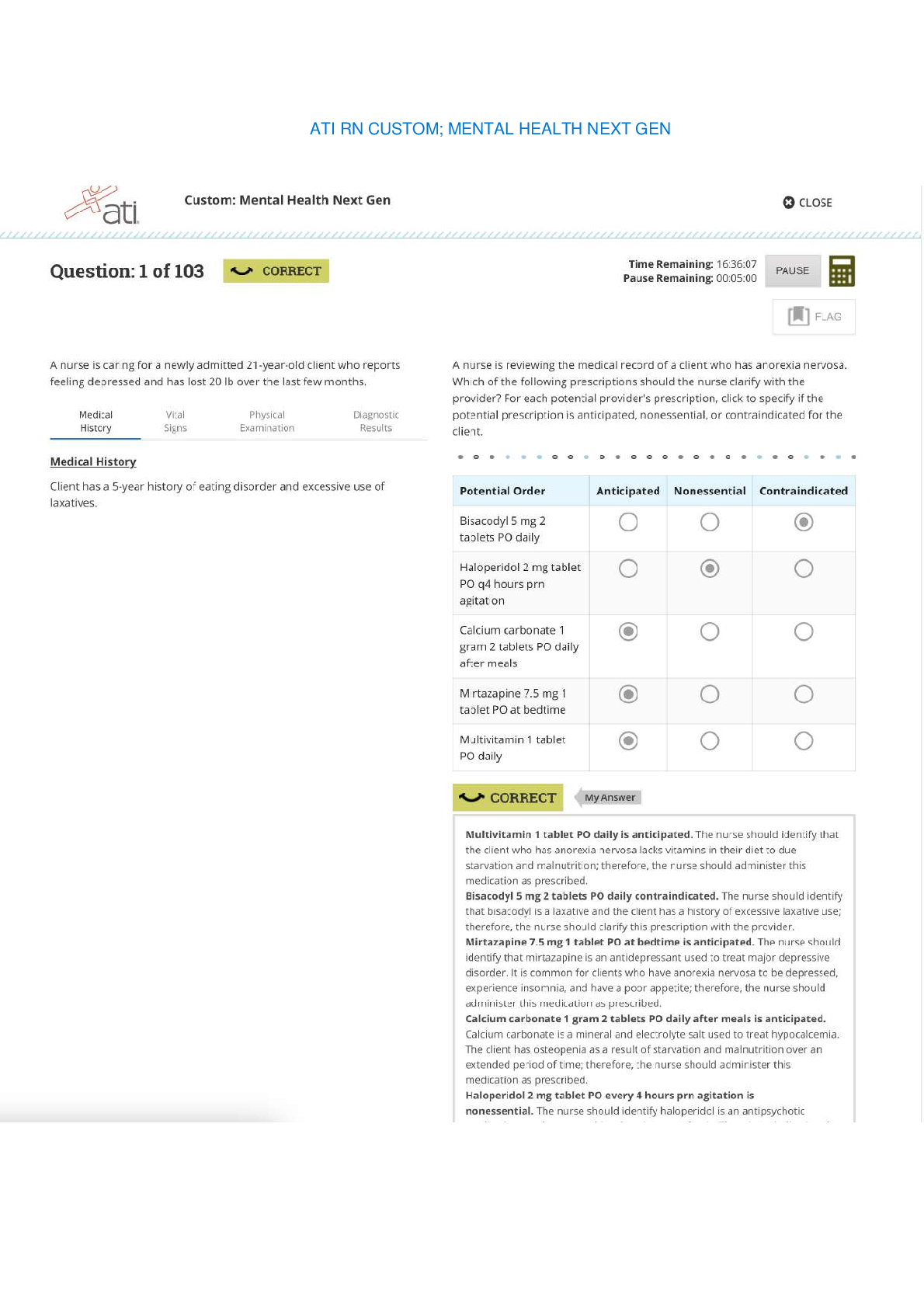
ATI RN CUSTOM; MENTAL HEALTH NEXT GEN
ATI RN CUSTOM; MENTAL HEALTH NEXT GEN ATI RN CUSTOM; MENTAL HEALTH NEXT GEN ATI RN CUSTOM; MENTAL HEALTH NEXT GEN ATI RN CUSTOM; MENTAL HEALTH NEXT GEN ATI RN CUSTOM; MENTAL HEALTH NEXT GE...
By EXAMHUB SOLUTIONS , Uploaded: Apr 05, 2024
$45.5
ATI Med Surg> EXAM > RN ATI MED SURG ALTERATIONS IN KIDNEY FUNCTION AND ELIMINATION ASSESSMENT. (All)
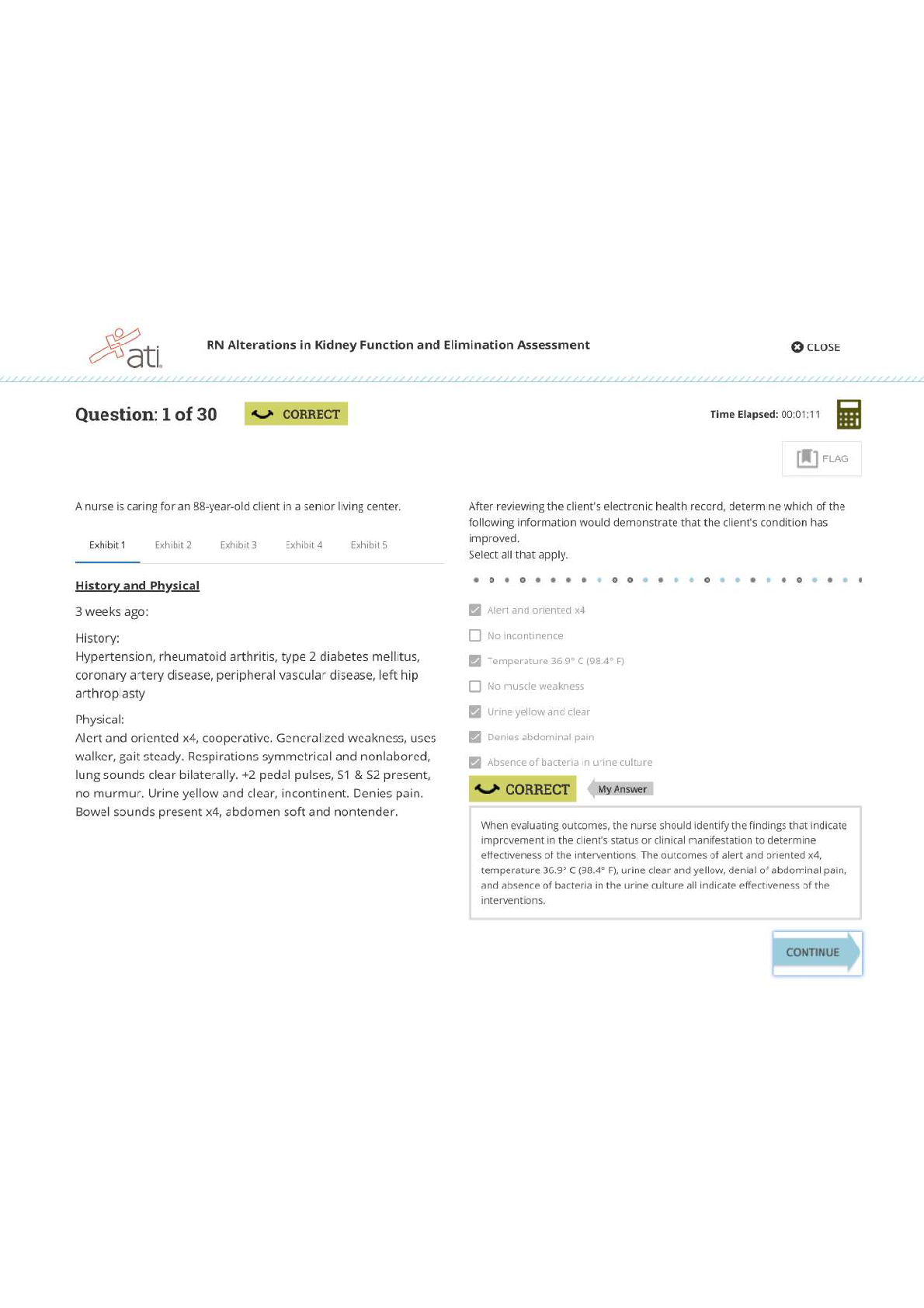
RN ATI MED SURG ALTERATIONS IN KIDNEY FUNCTION AND ELIMINATION ASSESSMENT.
RN ATI MED SURG ALTERATIONS IN KIDNEY FUNCTION AND ELIMINATION ASSESSMENT. RN ATI MED SURG ALTERATIONS IN KIDNEY FUNCTION AND ELIMINATION ASSESSMENT. RN ATI MED SURG ALTERATIONS IN KIDNEY FUNCTI...
By EXAMHUB SOLUTIONS , Uploaded: Apr 10, 2024
$28.5
Nutrition> EXAM > Nutrition Through the Life Cycle EXAM 2. 50 Questions & Answers. (Score 100%) (All)
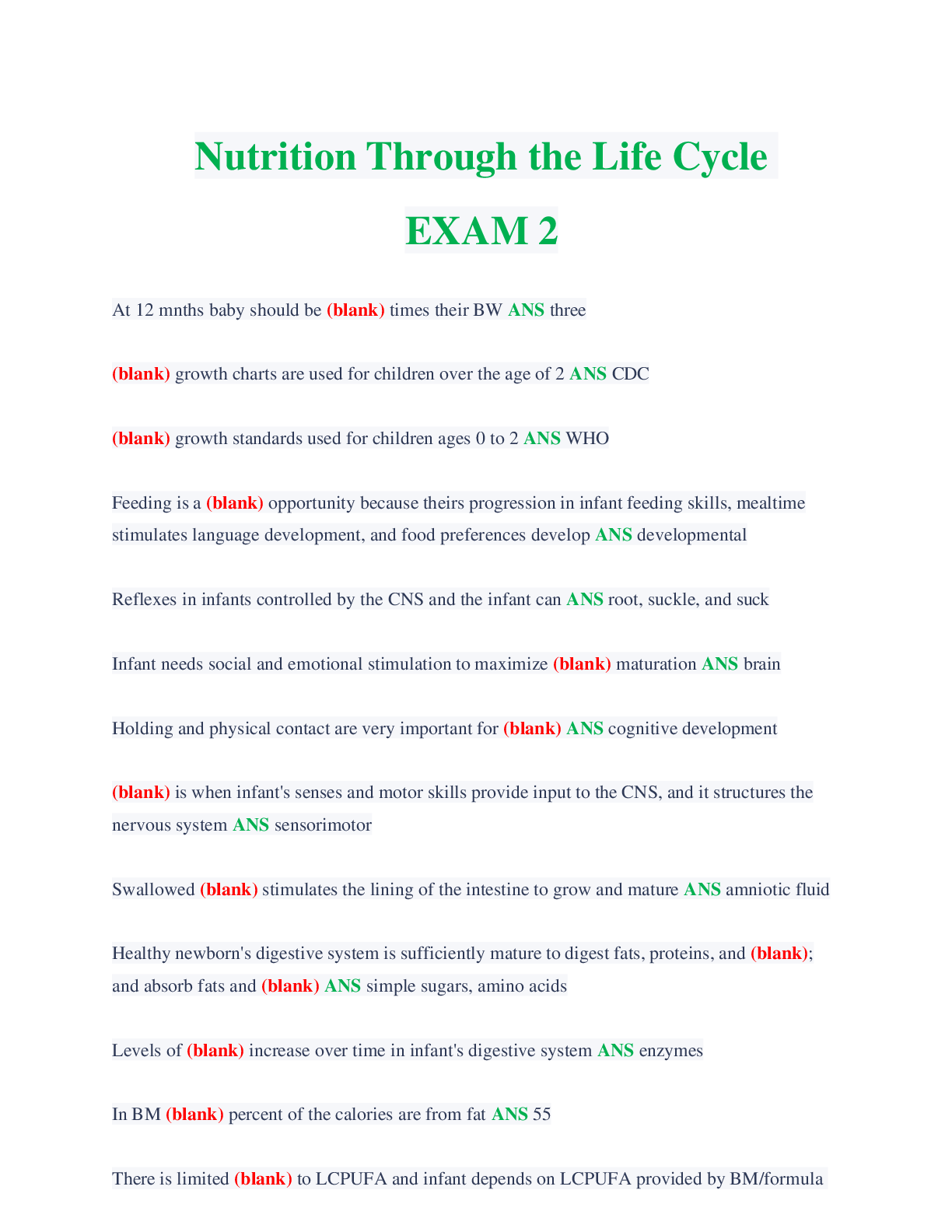
Nutrition Through the Life Cycle EXAM 2. 50 Questions & Answers. (Score 100%)
Nutrition Through the Life Cycle EXAM 2 Latest
By Academic mines , Uploaded: Apr 27, 2023
$10
Document information
Connected school, study & course
About the document
Uploaded On
Dec 04, 2022
Number of pages
15
Written in
Additional information
This document has been written for:
Uploaded
Dec 04, 2022
Downloads
0
Views
59






